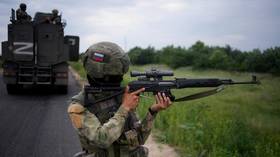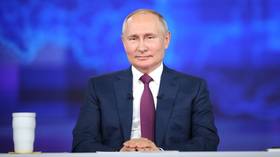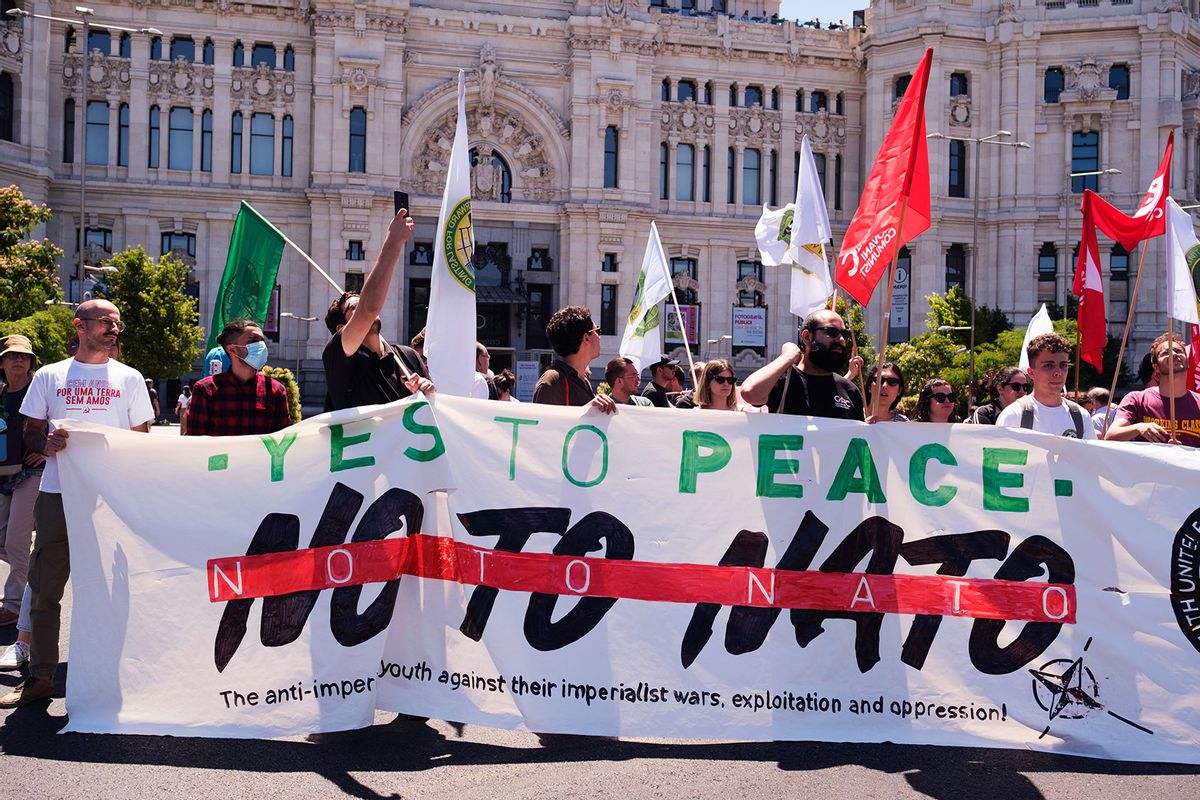有58%的乌克兰人认为:美国是俄乌战争的“罪魁祸首”
2022-07-04 07:57:29 来源: 火星方阵 

文/刺客
美国总统拜登原以为挑起俄乌冲突,让自己成为“准战时总统”,就可以拉高自己低迷的支持率,结果,他的国内支持率反而跌至36%的新低。当下的拜登可以说是两面不是人,在美国越来越多的人想要搞垮他,即便在乌克兰也不受该国民众的待见。
美国是西方世界中对乌军援最多最积极的国家。那么,拜登耗费了纳税人数十亿美元的血汗钱,在乌克兰那里得到了什么呢?据《参考消息》报道,芝加哥大学民意调查中心日前通过电话连线的方式,在乌国内进行了一次民意调查。结果显示:乌克兰民众不仅认为俄罗斯、而且认为自己的政府、美国和北约都应该为他们国家的冲突承担责任。
高达82%的受访者认为俄罗斯“要对此负责任”,这很正常,毕竟打人的是俄罗斯。不过,令外界匪夷所思的是,在此次由美国机构发起的民调中,居然有58%的受访者认为美国是乌克兰战争的“罪魁祸首”,其中26%的人认为“美国负有最大的责任”。
美国在乌克兰受憎恨的程度虽然远不如俄罗斯,不过,俄罗斯是被视为“侵略者”的国家,而美国则是耗费数十亿美元要“拯救乌克兰”的国家啊!对于这样的民调结果,华盛顿的政客们估计看了都会目瞪口呆。显然,乌克兰人也并非都是糊涂人。与基辅那些只顾着自己利益的政客相比,身处战争灾难中的老百姓对战争的看法更加客观。
美国确实就是乌克兰战争的罪魁祸首,在此之前,曾有美国政客公开宣称:华盛顿此举,就是要让乌克兰为美国削弱俄罗斯军事实力“战至最后一人”。美国政客这种嚣张言论,基辅的决策者可以装作不知,但乌克兰人不可能会将这种别有用心的国家当“救星”。所以,58%的乌克兰人将美国视为“灾星”,也是一种必然的结果。
拜登政府挑起乌克兰战争,受到伤害的并不仅仅只是俄乌两个当事国,美国及其欧洲盟友也都同样是这场战争的受害者。受战争和对俄制裁的影响,美国通胀率飙升至40多年来的最高水平,油价更是创下有史以来的最高记录。当美国人在高通胀率环境中苦苦挣扎之际,拜登居然还嫌他们受的苦还不够多。
日前,拜登说了一番令美国民众感到绝望的话:“为了乌克兰的胜利,美国高油价的持续需要多久就多久”。据美国《纽约时报》报道,拜登的这番言论很快遭到美国民众的严厉批评,很多人认为“这是耻辱”。也难怪,高油价导致的通胀危机,已经让美国民众苦不堪言。可拜登却为了支持乌克兰,还打算继续加深美国人的痛苦,不挨骂才怪呢!
从拜登仅有36%支持率的现状就可以看出,美国人是有多憎恨这糟老头。特朗普再不靠谱,至少还让美国白人有点自豪感,可拜登给美国人所带来的,却是“美国的耻辱”,显然,当数以百万计的美国人不得不在给汽车加油、或者购买食品之间做出艰难抉择的时候,拜登却为了乌克兰要让美国人“一穷到底”。 事实正如《纽约邮报》所言:“乌克兰在美国人民之上,这简直就是美国的耻辱”。
拜登既然希望“当乌克兰的好总统”,很多美国人自然就不会惯着他。所以,据环球网报道,美国最新民调显示:有超过28%的受访者认为,他们“可能很快就需要拿起武器反抗美国政府”。
在特朗普时期,因政治分裂严重,美国是否会爆发内战的问题,一直都是国际舆论热议的问题。拜登上台后,这种糟糕的现状非但没有改观,反而有愈演愈烈的趋势。拜登不计代价支持乌克兰的行为,正在激起美国人前所未有的愤怒情绪。所谓“官逼民反,民不得不反”,当高通胀率让美国人都活不下去的时候,还真不能排除他们会“拿起武器反抗美国政府”。
Ukrainians blame own govt alongside Russia for conflict – poll
1 Jul, 2022
https://www.rt.com/russia/558218-ukraine-us-nato-poll/
Almost 50% believe that Zelensky's government bears “a great deal of responsibility” for the ongoing fighting, according to the study
Ukrainians tend to believe that not only Russia, but their own government, the US, and NATO should all share the blame for the conflict in their country, a recent poll has found.
The survey, done by phone among 1,005 Ukrainians between June 9 and 13, was carried out by the National Opinion Research Center at the University of Chicago and paid for by the Wall Street Journal.
The participants were united on Russia’s role in the conflict, with 82% saying that the country bears “a great deal of responsibility” after sending its troops into Ukraine on February 24. Only 9% believed Moscow had nothing to be blamed for.
However, the poll made it quite clear that most Ukrainians don’t seem to agree with the narrative of President Volodymyr Zelensky and his Western backers that Moscow’s military operation in their country was an unprovoked aggression.
A whopping 70% of those surveyed said that the actions of the Ukrainian government also contributed to the outbreak of the conflict, with 47% assigning “a great deal of responsibility” to Kiev for it.
The US, which has been providing Zelensky’s government with billions of dollars in military and economic aid during Russia’s military operation, has been labeled the culprit by 58%. According to 26% of respondents, Americans bear “a great deal of responsibility” for the current state of affairs.
Ukrainians evaluated the role of the US-led NATO bloc similarly to the one of Washington, with a difference of just a couple of percent points. NATO’s eastward expansion and plans to make Ukraine a member of the alliance have been labeled a national security threat by Moscow and singled out as one of the main reasons for its offensive.
Another reason cited by the Russian authorities was the need to “denazify” Ukraine, but only 35% of respondents said they thought that the country’s “ultra-right nationalists” had any role to play in provoking the conflict.
Despite Russia’s steady advances in Donbass, Ukrainians appeared to be optimistic about the overall outcome of the fighting.
Only 6% said that it was “extremely” or “very likely” that Moscow would be able to retain all of the areas it now controls in Donbass and southern Ukraine if a ceasefire occurs.
According to 66% of those surveyed, Kiev is going to win back all of its lost land eventually, and things will go back to normal.
Russia sent troops into Ukraine four months ago, citing Kiev’s failure to implement the Minsk agreements, designed to give the regions of Donetsk and Lugansk special status within the Ukrainian state. The protocols, brokered by Germany and France, were first signed in 2014. Former Ukrainian president Petro Poroshenko has since admitted that Kiev’s main goal was to use the ceasefire to buy time and “create powerful armed forces.”
In February 2022, the Kremlin recognized the Donbass republics as independent states and demanded that Ukraine officially declare itself a neutral country that will never join any Western military bloc.
POLL FINDS MOST UKRAINIANS BELIEVE UKRAINE’S GOVERNMENT, NATO AND THE U.S. BEAR SOME RESPONSIBILITY FOR UKRAINE WAR
The poll was conducted by the nonpartisan and objective research organization (NORC) at the University of Chicago, with funding from the Wall Street Journal, from June 9 to June 13, 2022.
If you ascribe to the Western view that Ukraine includes Crimea and those regions of the Donbas that were under separatist control prior to the beginning of Russia’s invasion on February 24, 2022, then this poll very likely understates, to a considerable degree, the proportion of Ukrainians who believe that Ukraine’s government, the U.S. and NATO bear responsibility for the war. The reason for this is that the poll excluded Crimea and the separatist-controlled parts of Donbas, where there are relatively high concentrations of ethnically Russian and pro-Russian Ukrainians.
Moreover, Zelensky’s government has aggressively suppressed pro-Russian perspectives in Ukraine. In early 2021, Zelensky signed a decree banning three pro-Russian television channels. Then, in March of this year, Zelensky banned eleven political parties deemed by his government to be ‘pro-Russian’, including Opposition Platform — For Life, the largest opposition party in Ukraine’s Parliament immediately prior to the ban. If Ukrainians could express pro-Russian perspectives freely, it is reasonable to assume that an even higher proportion of respondents would have faulted Ukraine’s government, the United States and NATO for the conflict.
Even if we take these poll results at face value, the NORC/WSJ poll blows a gaping hole in the Western narrative about the Ukraine war. Specifically, Western governments have claimed repeatedly that Russia’s attempts to blame Ukraine, the U.S. and NATO for the war are ‘disinformation’. Are we seriously to believe that Ukrainians themselves are being manipulated by Russian disinformation? Notably, the NORC/WSJ poll found that seventy-six percent of the respondents viewed the Russian people very or somewhat negatively. It therefore strains credulity to suggest that Ukrainians in general are unduly influenced by Russia’s claims about the war.
Of course, none of this means that Russia is blameless for the war – indeed, the poll found that a huge majority of respondents (85%) believe that Russia bears a great deal (82%) or some (3%) responsibility for the war – but the claim that Ukraine’s government, the U.S. and NATO are innocent in this disaster simply cannot be reconciled with the views of the Ukrainian people.
What Putin's invasion of Ukraine looks like for everyday Russians
https://news.uchicago.edu/story/putin-war-ukraine-russia-economy-disinformation-censorship-konstantin-sonin
Russian scholar examines disinformation and turmoil in his home country—and explains his decision to leave
The day after Prof. Konstantin Sonin finished a public lecture in Moscow, Vladimir Putin launched a full-scale invasion of Ukraine.
A Russian citizen, the University of Chicago scholar has been a frequent critic of Putin’s autocratic regime. But the president’s attack on Ukraine was coupled with even more draconian restrictions on speech—clamping down on social media platforms, and even threatening imprisonment for dissidents. Facing the risk of arrest in Russia and dwindling options for his role as a public intellectual, Sonin returned to Chicago this month, cutting short a planned sabbatical year abroad.
A leading political economist, Sonin said that the ongoing war is not only exacting horrific brutality on Ukrainians; it could also bring about “the end of Russia.”
The following is edited from a recent conversation with the John Dewey Distinguished Service Professor at the Harris School of Public Policy, who discusses Putin’s isolation, the consequences of disinformation and censorship, and the bleak outlook for everyday Russians.
There is no fully satisfying explanation. Certainly, as my research has shown, part of it is that the leader of a kleptocracy—like Russia is today—blocks channels of information and surrounds themselves with incompetent loyalists. This is what we have seen with Putin. As a result, the Russian people have a very different (and wrong) view of what's going on in Ukraine and in the United States.
Putin is in his 23rd year in power. After two years of isolation brought on by COVID-19, he is likely completely devoid of reality. The bottom line is that, even if we don’t fully understand why this is happening, we do know that it’s terrible for Ukrainians right now.
In the long term, it might also be the end of Russia. I could imagine a spiral of worsening economic situations. After that it could naturally disintegrate, possibly into several countries, like Germany did after World War II.
You have been on sabbatical for a year in Russia. Why did you leave early?
In Russia, it’s now a crime to call the war a war. It’s criminal to call human suffering, human suffering. It's criminal to say that Russian troops have killed peaceful Ukrainians. And all of this can be enforced retroactively, which means that statements I made weeks or months ago could lead to my arrest. Yet even if I could remove my previous statements from the internet, I would not do so. This makes it likely that I would have been arrested very soon.
Part of the reason I was in the country for the 2021-22 academic year was to stand in solidarity with my peers and to speak out against Putin and his anti-democratic activities, which have had a lot of negative implications beyond politics. Since the start of the war, my role as a public intellectual was effectively closed off with the government shutting down most non-state media, including public radio and television. Russia has also blocked access to Facebook, which has become my primary social media venue. What I have is my words. Since I had no ability to speak out any longer, what was left to be done?
What do everyday Russians know, and what do they think of the war?
Remember that the vast majority of Russian citizens do not use sophisticated social media networks. So many do not know that there is a war. On the state media, they hear about border skirmishes. They hear rubbish about “de-Nazification.” They hear there are no casualties—even though if they were on Twitter or TikTok, they would see hundreds of Russian vehicles being burned, dozens of prisoners of war in Ukrainian custody, and all sorts of carnage.
Citizens are scared to tell the truth. It’s a totalitarian regime. When asked for a survey, they think that their loyalty is being tested and they feel threatened. I’m not surprised that they seem to be supporting Putin at this point based on polling data, but that may change and there will be signs when that happens.
What are the economic consequences that the war has wrought for Russia and its citizens?
The short-term economic disruptions are significant, and they have been caused by the combination of war itself, sanctions, and the change in behavior of hundreds of major firms—including ExxonMobil, McDonalds, Starbucks—around the world. Most Western brands have either closed permanently, or at least closed their shops and stopped supporting digital platforms. Eventually the factories will be closed as well.
This will be felt very acutely around Russia. The ruble has depreciated more than 60%, and that, in turn, has caused the government to strictly limit the amount of dollars that can be withdrawn from banks. This of course hurts Russia’s poor, because dollars are the primary asset that protects against inflation, which is spiraling. This hurts the average citizen already and it’s likely to get worse.
What signs of change, if any, should we be on the lookout for?
Watch what Russia’s citizens do, not what they say. For example, despite whatever Putin and state propaganda say about the eventual demise of the United States and Western Europe, Russian people rushed to banks to withdraw dollars and euros before it was too late. They already started to ignore what the government says rather than obediently following Putin, which is a sign that they know something is deeply wrong with the state of affairs.
“In Russia, it’s now a crime to call the war a war. It’s criminal to call human suffering, human suffering.” —Prof. Konstantin Sonin
Are you surprised by the West’s response?
It was not difficult to predict that once people around the world saw the shelling of peaceful cities, millions of refugees, children and women being killed by indiscriminate bombing, that there would be sanctions to stop this war. The day before the war began, I was giving a public lecture in Moscow. When asked, I said that potential sanctions and the West’s reaction will depend on how far our tanks go. If they go to Mariupol, then it will be one thing. If they go to Kyiv, it's a different thing. The West’s response isn’t surprising, given the scope and brutality of what we’re witnessing. At the same time, I think that the Biden government, which struggles on many domestic frontiers, has done a commendable job in both helping Ukraine and building a worldwide coalition to stop the aggressor. Even before the outbreak of the war, I was positively surprised by how well-informed and attentive the Biden administration was to what is going in Russia and Ukraine.
How would you grade Biden’s response?
The administration has been impressive in their support for Ukraine. The Biden administration has been very effective at galvanizing other countries and taking a bold stand. Of course, Ukraine wants more help, more arms, a no-flight zone. But the current administration has been better than the Obama or Trump administrations in this respect. Middling responses to Putin’s provocations in Syria and Libya and his annexation of Crimea in the past likely emboldened Putin.
What do you think is going on in Putin’s head right now?
He doesn’t have a realistic picture of what’s happening; he can’t accept the reality. I don’t think he knows that the Russian casualty rate is so high. I doubt he understands that the Russian army shells big cities and that the toll it’s taking on civilians is intolerable for the whole world. He likely does not understand the sanctions, how they make life miserable for Russians. Even when he gets accurate information—and I am not sure that gets accurate information—he simply ignores it.
He's not actually interested in what is going on in Russia. When he announced the invasion, he didn't speak about COVID. He didn't speak about economic difficulties. He didn't speak about the burden of sanctions. He’s seemed far more interested in what happened 100 years ago during the first Russian Revolution.
I think that the eventual peace and decision to withdraw will be made by different people. I hope they’ll be made by different people.
How will you continue to make yourself heard?
I was one of three authors who circulated a letter for economists opposing the war, which was eventually signed by some 350 Russian economists working around the world. This may not sound like much, but it is when you consider that it is now a state crime in Russia to refer to the invasion as a “war” or to say that Russia is at fault. It’s hard to overstate the bravery of the 50 or 60 signatories who are continuing to work in Russia. As of now, they are not being persecuted and they cannot be fired yet. But still, this is extremely courageous, as we do not know what will happen next. Similar letters were written and signed by people of other academic professions.
If I return to Putin’s Russia, I could be sent to prison for 15 years for saying what I’ve said to you. As much as I’m happy to talk to Western audiences, I will continue to prioritize reaching average Russians and tailoring my message to those there who have the most impact and to do the most good.
—This story was first published by the Harris School of Public Policy.


